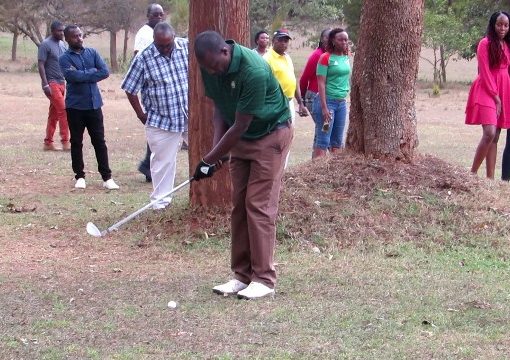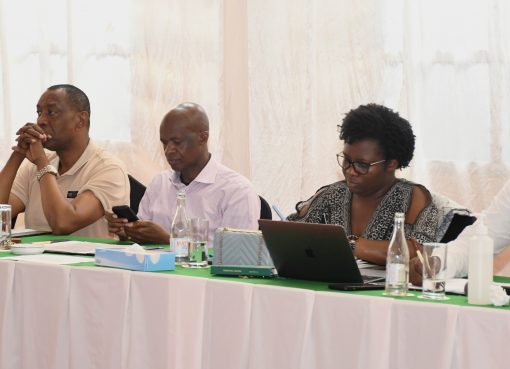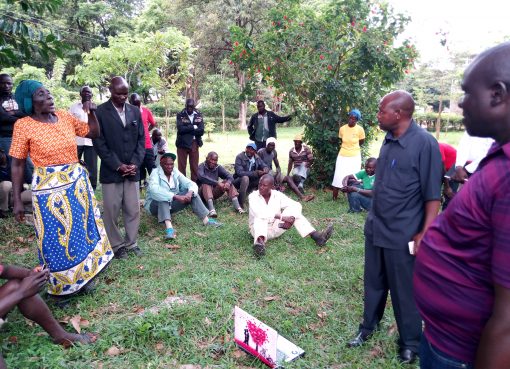He is well known for crafting a variety of artifacts to promote and preserve the cultures of various tribes in Western and Nyanza region.
Kassim Akhwale, aged 54 years, has made this a lifetime passion, because, “of my love for African cultures and as the best way to use my creative arts talent.”
He has exhibited his art collection across East and Central Africa, under the category of Cultural Arts, that includes attires, ornaments, regalia, musical instruments, utensils and furniture.
Tools of African arts are drawn from nature, mainly from products of plants,birds and animals,which are readily available.
“This makes the artform cheaper than the others, which depend on industrial raw materials and tools,” he said. He therefore utilises tree barks, sisal fibers, seeds, gourds, grass , sticks, bones, feathers, hides and horns.
Akhwale mainly works by hand in weaving, shaping and decorating his products mostly under tree shades in Kisumu and Kakamega towns, but also at his home, in Mumias East Location.
“Where need be, I just use simple hand tools, such as knife, panga, hammer, broken glass and chisel.”
His main markets in Western and Nyanza regions, are traditional dancers, singers and instrument players, for whom he makes sisal skirts, head gear, arm bands, tunics and musical instruments such as drums, horns, gongs, African violin, nyatiti and isikuti.
The artist said he teaches himself how to play the instruments, to enable him test the quality of their performance for customers.
Cultural leaders of the Luo, Bukusu, Iteso, Batsotso, Wanga and Marama, are also his customers for ceremonial attires and regalia, that include goat skin aprons, neck garlands, hats and belts. Even political leaders do buy his fly whisks, walking sticks, decorations and ornaments.
His photo album shows him presenting some of his artefacts to various prominent leaders , among them Deputy President William Ruto, Kakamega Governor Wycliffe Oparanya, Mumias East MP, Benjamin Washiali and some past envoys to Kenya at diverse functions.
The creative artist also supplies part of exhibitors with various artifacts during the Bukhayo, Maragoli,Wanga , Luo and Bunyore cultural festivals.
Akhwale also gets hired to make for schools and colleges skits and decor, for cultural content, in music and drama festivals saying, “I’m keen to market in the educational institutions, because the youth there should be exposed to cultural artefacts for continuity.”
Women enthusiastic about African accessories , also buy his earrings, necklaces, hats, bags and bangles, made from beads, shells, seeds , feathers and bits of porcupine spines.
He sells such items directly or supplies some boutiques in Kisumu and Kakamega towns.He has supplied me with value added accessories for five years, and these are popular with my clients keen on African products,” said Janet Abong’o, a business woman at Kondele Estate in Kisumu town.
It is apparent that his passion and talent encompasses all sectors of cultural life, as you can also spot some of his artifacts in homes and houses, among them brooms, vessels, carpets, baskets, tables and stools, all made from grass, reeds and sticks. Even in some public and private offices , you would find pen holders, trays and waste baskets, made by him from the same materials.
To add value to beauty accessories and decorations, Akhwale uses paint, junk copper wires, aluminium foil and nylon strings.
“ I gather my raw materials from bushes and junkyards, where I get items to re-cycle, and that way, also help in cleaning the environment,” he stated.
For grasses and reeds that do not grow easily in the wild, he has set aside gardens for growing them.
Akhwale also makes puppets and paraphernalia that have been used by certain tribes in games and traditional rites over generations.
To keep abreast with the diverse needs of his customers, the artist says he attends many cultural and creative arts workshops, consults experts, watches cultural films, and reads reference books.
He promotes his products and passion for African culture by participating at Agricultural Shows , Field Days and Trade Fairs, in Western and Nyanza regions, and at local technology exhibitions across East and Central Africa.
Through the Ministries of Culture, Trade and Technology over the years, Akhwale has exhibited in Nairobi and Mombasa and in , Uganda, Tanzania, Rwanda and Burundi.
He forlornly, showed a letter that had invited him to exhibit in South Africa in 2017, but failed to attend because he was unable to raise Sh.25,000 needed by the event organisers.
The cultural artist remembers that in Kakamega last year, during the Devolution Conference, he made good business, “because participants from other counties. I had items that would remind them of the region. He said the organisers asked him to make a traditional table that was to be presented to President Uhuru, after opening the conference, but he did not turn up in person, but instead addressed participants through video link.
“The event organisers however assured me the gift was taken to the President in Nairobi.”
During such events, and orders for festivals, the artist can sell products worth up to Sh.50,000, compared to other times, that he could get as low as Sh.2,000 a month.
He recalled that in 1997, he caught the attention of former President Moi, with his towering puppet that depicted the Kanu cock.
“Moi had come to Butere, and I was singing in praise of the party, and dancing with my puppet, then the President joined in, congratulated me for patriotism, then pressed on my palm Sh. 20,000.”
Akhwale’s talent for creative arts emerged early when he was at Kamashia Primary School in Mumias East, and at Namulungu Secondary School, in Matungu sub-County, where he dropped out at Form Two, for lack of fees, in 1984.
But dropping out of school did not dampen his creative spirit instead he has soldiered on despite the low market and fluctuating income, for indefinite periods.
“I only sell well during shows and exhibitions, but other times many people in my catchment areas are not enthusiastic about African items,” he said. The artist therefore feels that his market would have been better if he could afford to rent town centre shops, along roads where tourists and the elites, who appreciate African art pass.
To boost the market for his products, the artist said he also needs a working capital of at least Sh.1 million to supply customers who make bulk orders for his products during regional exhibitions.
Despite the fluctuating earnings, Akhwale says he still derives satisfaction from the passion of preserving and promoting African cultures, through his talent in creative arts.
By Paul Olale




